In memoriam
Alan ASTBURY, PhD, FRS, FRSC (Adjunct and Emeritus Professor)

In memory of Dr. Alan Astbury
November 27, 1934 - July 21, 2014
Dr. Alan Astbury, Professor Emeritus of Physics at the University of Victoria, died on July 21 following a brief illness. Alan, a leading figure in Canadian science, served as Director of TRIUMF from 1994-2001.
His distinguished career began in the U.K. Born in Crewe, he obtained his Ph.D. at Liverpool and, following postdoctoral work at Berkeley, was a scientist at the Rutherford Laboratory from 1963-1983. He served as co-spokesperson of the UA1 collaboration at CERN, whose discovery of the W and Z bosons confirmed the unification of the electromagnetic and weak forces and led to a Nobel Prize. Alan came to Victoria in 1983 as the R.M. Pearce Chair of Physics, and established a strong particle physics group through experiments at SLAC and CERN. He was Director of the Canadian Institute of Particle Physics from 1991-1995. As Director of TRIUMF, he secured increased federal investment in the lab, built the ISAC facility and provided substantial Canadian contributions to the LHC accelerator and the ATLAS detector.
Following his retirement, Alan served as President of the International Union of Pure and Applied Physics (IUPAP) from 2005-2008. He was elected as a Fellow of the Royal Society of Canada and of the British Royal Society, was awarded the Rutherford Medal of the Institute of Physics, the Lifetime Achievement medal from the Canadian Association of Physicists, and the BC Science Council Career Achievement Award. Alan held honorary degrees from the Universities of Liverpool and Victoria and from Simon Fraser University.
Alan animated the lives of his friends and colleagues with his energy, integrity, commitment and humour - he will be sorely missed. He is survived by his wife, Kathy, and two daughters, Elizabeth and Gillian.
George Atherley BEER, PhD (Emeritus Professor)
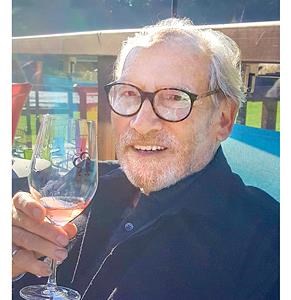 In memory of Dr. George Atherley Beer
In memory of Dr. George Atherley Beer
January 3, 1935 - January 11, 2022
Dr. George Beer, Professor Emeritus of Physics at the University of Victoria led a full, eventful and happy life in all his 87 years - he considered himself very fortunate. He once said that if UVic hadn't employed him to teach physics and research, he would have happily done it voluntarily. He thrived in the universe of the unknown and what was possible.
Born and raised in Salmon Arm to the late Clinton and Helen (nee Ledingham) Beer, he left for UBC where studying Engineering Physics set the course for his life's work. After completing his graduate degree, he went with his late wife Patricia to work at the Chalk River accelerator in Deep River. He knew then that he had a passion to teach. He continued with a PhD in Physics from the University of Saskatchewan and post-doc work for three years in Germany. George started at UVic in 1969 and remained there until retiring in 2000. He was a strong advocate in starting UVic's engineering program, was one of the first UVic faculty at the inception of UBC's TRIUMF site, led the charge for a co-op physics program and encouraged more women to enter physics. George's particle physics research led him to work at CERN in Switzerland (where electronic data sharing ushered in the beginning of the world wide web), Japan and Italy over many years and trips. That research continued until the end of his life as did his longterm friendships with colleagues. For more than 15 years, he brought students from Vancouver Island to campus for two days of open houses and Science Olympics. He demonstrated the wonders of physics by sandwiching himself between two beds of nails topped off by a piece of concrete that someone broke with a sledgehammer over his chest. He heard from numerous colleagues, students and family that he had had a big influence on the direction of their lives. His legacy lives on through a scholarship to support bright young minds pursuing STEM studies at UVic.
George loved photography, travel, skiing, hiking and reading. Highlights included trips to Hokkaido, Newfoundland and Haida Gwaii with his wife Leslie, Morocco and Spain with daughter Theresa and exploring Europe by van with his family in the 1960s. His heart was most connected to the West Coast and Whistler, its forests, mountains and oceans. He captured the beauty of the nature he loved in his photographs. George's broad life interests extended to art, classical music, wood working and culinary adventures. He and Leslie found much happiness in experiencing and talking about the beauty and mystery of life. George will be remembered by those who loved him for his laughter, kindness, curiosity and passionate embrace of all life has to offer.
George is predeceased by his wife of 34 years Patricia (nee Barr) and his sister-in-law Nanci Balogh. He is survived by his wife of 17 years, Leslie Knight and her son Brooker Wise, his daughter Theresa Beer and her partner Chris Grabowski, his brother-in-law John Balogh and nephews Jonathon and Chris Balogh and their families and his cousins Sheila McCaul (nee Ledingham) and Sylvia Greenwood (nee Ledingham). A celebration of life is planned for the spring.
Donations can be made to a scholarship fund started by George and Leslie: https://extrweb.uvic.ca/donate/beer-knight-scholarship
Shawn BISHOP, PhD (student alumnus)
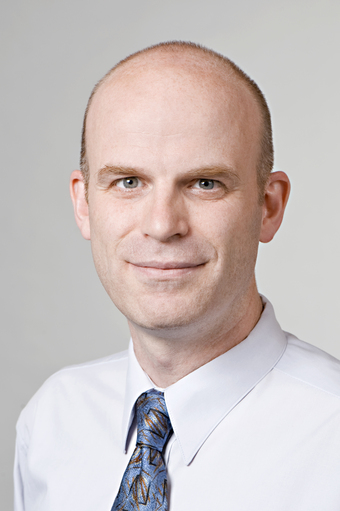 In memory of Dr. Shawn Bishop
In memory of Dr. Shawn Bishop
1971 - 2021
After a long and serious illness Shawn passed away on 19th October 2021, just a few days before his 50th birthday. Shawn was one of our alumnus; he was a graduate of our particle physics program. He arrived at UVic in 1995 to an MSc during which he built an elaborate liquid argon system and liquid argon ionization chamber that he tested with cosmic rays for his thesis. He went to SFU to do a PhD in nuclear astro-physics at TRIUMF and then a postdoc at Riken in Japan. From there, he was hired as a faculty member of nuclear astrophysics at the Technical University of Munich in 2008. He pursued this interdisciplinary research field by bringing together experts ranging from Nuclear Physics and Chemistry to Astrobiology, Geology and Anthropology.
After major contributions to the success in time resolved fingerprint detection of galactic 60Fe using magneto fossils from the Pacific Ocean he embarked on a new venture, to search for r-process 244Pu in selected sediments. He himself, together with different teams of geologists, from the Atacama Desert in Chile, and the Turkana Basin in Kenya, collected several series of samples. Always equipped with his chisel and a GoPro camera, he lead several expeditions to collect well dated fossils to answer the still open major question: “Are Core Collapse Supernova the source of r-process nuclei?”
He was an active member of the SFB1258 “Neutrinos and Dark Matter in Astro- and Particle Physics” proposing pioneering missions and transdisciplinary studies in nuclear astrophysics. Being convinced that his latest results will be a major break though for the field, he was working until the last week of his life to get them published, a task which now has to be finished by his students.
Shawn was a talented, brave, and passionate scientist and teacher who always searched for evidence, never afraid of the unknown and with an unbreakable will to live. He loved teaching - lecturing was, even when already marked by his destiny, a source of great joy for him and highly appreciated by his students.
Crystal BRASSEUR, MSc (student alumna)
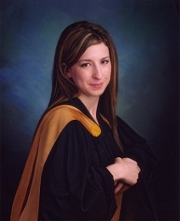
In memory of Crystal Marie Brasseur
November 24, 1983 - May 7, 2011
Crystal was born in Saskatoon and grew up in Martensville, Saskatchewan. Upon graduation from high school she spent a summer as an art student at the British Institute of Florence in Italy. Crystal completed two degrees in our department: a BSc Honours degree in Physics and Astronomy (2007) and an MSc degree in Astronomy (2009). She was co-supervised by Dr. Peter Stetson from the Herzberg Institute for Astrophysics, with whom she learned how to reduce photometric data, and by Prof. Don VandenBerg, who advised her in the art of fitting theoretical models to observations. In the course of her work, she reduced and analyzed images from the WIRCam wide-field imager on the Canada-France-Hawaii Telescope and the HAWK-I camera on the European Southern Observatory’s Very Large Telescope in Chile. Crystal's thesis was published in The Astronomical Journal, 140, 1672, 2010. At the time of her death, Crystal was pursuing her PhD degree in Astronomy at the Max Planck Institute of Astronomy in Heidelberg, Germany.
Crystal had many other interests including travel, classical music, art history, photography, painting in oils, and playing the violin. From her travels in Chile and Germany, she became proficient in both Spanish and German.
Crystal is greatly missed by her many colleagues and friends in our department.
John CLIMENHAGA, PhD (Founding Chair, Physics and Astronomy)
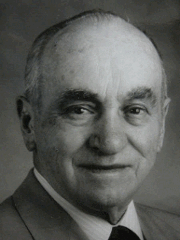
In memory of Dr. John Climenhaga
November 7, 1916 - May 27, 2008
John earned a B.A. Honours degree in Physics and Mathematics (1945) and an M.A. in Physics (1949) from the University of Saskatchewan. In 1949, he became a faculty member of Victoria College (the predecessor of the University of Victoria) where he taught physics. He became head of Physics at the college in 1953 and played a leading role in the transition from college to university in 1963. He remained the Chair of our department through to 1969.
In addition to physics, John developed a keen interest in astronomy leading to a PhD in Astronomy from the University of Michigan in 1960. He is credited with developing a program in Astronomy in our department in 1965 as well as developing many of the early research efforts. He also spearheaded UVic's participation in the early 1970's in TRIUMF – the Tri-University Meson Facility located at UBC. He became the Dean of Arts and Science at UVic in 1969, a position he held until 1972.
John retired in 1982 at which time a scholarship was set up in his name and the observatory on the roof of the Elliott building was named in his honour. Throughout his retirement, he continued to teach and give talks. He was granted an Honorary Degree of Doctor of Science by UVic in 1996 in recognition of his many contributions.
John will always be fondly remembered for his unfailing dedication to our department.
Fred COOPERSTOCK, PhD (Emeritus Professor)
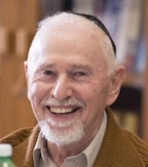
In memory of Dr. Fred Cooperstock
August 20, 1940 - January 17, 2018
Dr. Fred Cooperstock, Professor Emeritus of the Department of Physics and Astronomy at the University of Victoria, passed away suddenly in January 2018. Fred’s distinguished career spanned almost 40 years. He earned his PhD in 1966 from Brown University and after a short postdoctoral appointment at the Dublin Institute for Advanced Studies, he took up a faculty position at the University of Victoria in 1967.
Fred’s major fields of study included General Relativity (Gravitational waves, energy localization, gravitational collapse, singularities), Cosmology (Inflationary models), and Modelling Elementary Particles (solitons, coupled Dirac-Maxwell equations). Over the course of his career, Fred supervised and mentored 11 PhD students and 13 MSc students. Fred liked to think outside of the box and challenge conventional ideas in physics. His numerous publications earned him a number of awards and honours including being an invited nominator for the Nobel Prize in Physics for 2001.
Upon retiring in 2006, Fred had more time to pursue his interests of photography, badminton, and traveling. He is survived by his loving wife Ruth, his children Jeremy and Ramona and his grandchildren and sister.
Harry DOSSO, PhD (Emeritus Professor)
 In memory of Dr. Harry Dosso
In memory of Dr. Harry Dosso
January 9, 1932 - October 6, 2024
Dr. Harry Dosso, passed away on Oct. 6, 2024, at the age of 92 (born Jan. 9, 1932). Harry was a Professor in the Physics Department from 1963-1997, having also taught physics at Victoria College from 1958-1963. He served as the Head of the Physics Department from 1969-1975 and as Coordinator of the Physics Co-op from 1975-1996, among many other roles. His research was in analogue modelling of geoelectromagnetic induction in the earth and oceans, which he carried out in a lab in the basement of the Elliott Building.
Upon retirement from UVic in 1997 he became Emeritus Faculty Member in PHAST and established the Harry and Martha Dosso Scholarship in Physics, which has been awarded annually ever since.
Werner ISRAEL, PhD (Adjunct Professor)
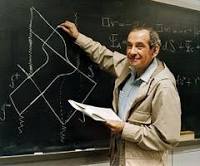
In memory of Dr. Werner Israel
October 4, 1931 - May 18, 2022
Werner was born in Berlin, Germany and raised in Cape Town, South Africa where he earned both his B.Sc. (1951) and M.Sc. (1954) from the University of Cape Town. He then received his Ph.D. in 1960 from Trinity College, Dublin. A giant figure in the theoretical study of general relativity and gravity over the 20th century, Werner was famous for many things, including his work showing the remarkable simplicity of black hole solutions in the late 1960’s, contributing to the so-callled “no hair” theorems. His research also elucidated the interior structure of black holes, the properties of thin shells of matter in general relativity, and the formalism to describe relativistic thermodynamics and hydrodynamics.
Werner had a remarkable career, which stretched into his 80’s. After officially retiring in 1996 from the University of Alberta, Werner moved to Victoria, B.C. and continued working at UVic as an adjunct professor on research, teaching and graduate supervision for more than 15 years.
Werner was truly humble about his achievements, whether it was co-editing two volumes on gravitational physics with Stephen Hawking or being the recipient of many awards, including a Fellowship of the Royal Society (London) and an Officer of the Order of Canada.
Paul LIM, PhD (Adjunct Assistant Professor/Sessional Lecturer)
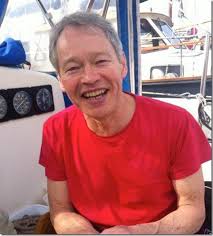
In memory of Dr. Paul Lim
November 9, 1948 – August 2016
Born in Liverpool, Dr. Paul Lim received his B.Sc. (Physics and Mathematics) in 1969 from Imperial College, London. He went on to pursue graduate degrees, earning his MSc (Solid State Physics) from the University of Western Ontario in 1973, and his PhD (Theoretical Physics) from the University of Victoria in 1977 under the supervision of Professor Fred Cooperstock.
During his career, Paul taught at all university levels in many different countries including Brazil, Peru, Chile, Argentina, South Africa, and Canada, conducting lectures in English, Spanish and Portuguese. He also served as an educational consultant advising publishing companies on scientific textbooks designed for children. Throughout his career, Paul provided private tutoring in physics and math to many generations of students.
Paul had a passion for travel and adventure, completing several solo expeditions on his beloved 38-foot sailboat, Kekuli, that he rebuilt from scratch. He sailed extensively through the Southern oceans and also completed a kayak expedition in the Amazon Basin. Sadly, Paul was lost at sea in August 2016 while on a return sailing trip from Hawaii.
To commemorate Paul’s many years of teaching first-year physics in our department, the PHYS 102 lab was dedicated to his memory with a plaque that reads ~ “In memory of our colleague and friend, Paul Lim, an instructor to many thousands of first-year physics students, whose passion for life and work was an inspiration.”
John T. WEAVER, PhD (Emeritus Professor)
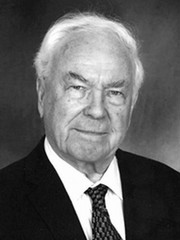 In memory of Dr. John T. Weaver
In memory of Dr. John T. Weaver
November 5, 1932 - April 26, 2025
Dr. John Weaver was a beloved and respected member of the UVic community for 32 years, serving as a professor in Physics, Astronomy, and Earth and Ocean Sciences. He also held key leadership roles as department chair and Dean of Science, where he was known for his wisdom, kindness, and steady guidance.
Born in Birmingham, UK, John studied mathematics at Bristol University before coming to Canada to complete his MSc and PhD in physics. He joined UVic in 1966 after working as a research scientist at the Pacific Naval Laboratory.
As Dean, he played a vital role in shaping the Faculty of Science, helping to launch the School of Earth and Ocean Sciences and pioneering ocean research initiatives like the NEPTUNE and VENUS cabled ocean observatories.
A passionate geophysicist, John made lasting contributions to the study of geomagnetism and published a book in 1994 on geo-electromagnetic induction. Even in retirement, he remained deeply involved in the university, mentoring young faculty and staying closely connected with colleagues.
John’s presence, warmth, and dedication will be missed by all who knew him. He is survived by his wife of 65 years; his children Andrew, Anthony and Alexandra and his grandchildren and sister.
